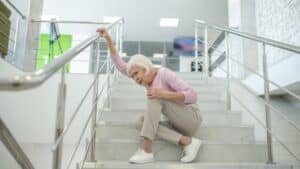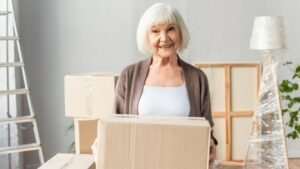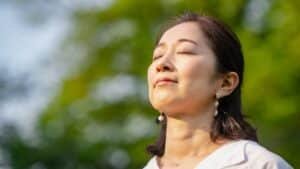
It was the middle of the night, and I had gotten up to pee. I noticed a light coming from downstairs. That’s strange, I thought. No one else here but my sleeping husband. Oh dear, I will need to go down and turn it off.
That was the immediate plan.
I leaned over the banister to see which light was on, and the next thing I knew I was on my backside falling, or perhaps sliding, and sliding and sliding on the carpeted stairs. I must stop, I said to myself, but couldn’t think how to do so.
The next thing I knew I was at the bottom of the staircase and quite taken aback.
I called out to my husband, who had been woken by my exclamations, and asked if I was OK.
And, strangely, I was.
The Immediate Aftermath
I stood up and seemed to be able to do so. Nothing was hurting really badly, although there were mild aches and pains all over the place. I twiddled my fingers and toes and moved my arms and legs, and everything seemed to be working.
Indeed, I limped slightly and managed to turn the offending light off.
It’s then when it hits you – a terrible sense of shock. I am sure-footed, I don’t fall down the stairs. Yes, I am 81, but I am in reasonable shape. How could this be?
I figured that I would be covered in bruises and looked online to see what to do about bruising. Everyone said to use ice. So, I collected some ice cubes into freezer bags and went to lie down on the spare bed, so as not to keep my husband awake.
I knew I wouldn’t sleep for ages, because if you want a way to become really wide wake in the night, falling down the stairs is a good solution!
I am no doctor, but I assume the shock of the event brings the adrenaline, and the adrenaline makes you completely awake. I lay there with the ice bags pressed against various parts of my body and listened to a podcast. (My husband, bless him, went back to sleep. That was fine, there was nothing else that he could do.)
Medical Check
The NHS (National Health Service in England) gets a lot of flak these days for not keeping up with the job, but sometimes it is brilliant – and this was one of them.
My GP (General Practitioner) group practice has a system where you can phone at 8 a.m. and ask for an ‘emergency’ appointment, and I did so the next morning, somewhat bleary eyed for lack of sleep. I was asked if I could make an 8.40 a.m. appointment and, with enormous haste, succeeded in doing so. The practice is fairly close by.
By 9 a.m., I was walking out of the building with a clean bill of health from the GP, a young woman who I particularly like. Nothing broken or sprained. Everything checked. Just a few bruises and a couple of burns where my skin had rubbed along the carpet.
And doctor’s advice that I should ‘take it easy’ for a day or two. Not difficult to follow that.
Falls Among Older People
I used to be a social researcher, and I learned lots of useful (and not-so-useful) information in my time. Although I never did any direct research on the topic, I certainly learned that old people have frequent falls, and it is not good news when they do.
A quick check on Google informed me that, in the UK, one in three adults over age 65 (and half of people over 80) have at least one fall in the course of a year. Ten per cent of such falls result in a fracture, including a few (2%) of the hip. It can take months to fully recover.
The information from the US suggested that more than one in four adults age 65 and over experiences a fall each year. Falls are the leading cause of fatal and non-fatal injuries among older adults.
The consequences of a fall go much farther than the physical problems that ensue. Older people can lose confidence after a fall and may fear going out on their own. This leads to isolation and possible depression.
Now, mine wasn’t a full fall, in the sense of falling in the street and landing any which way. More of a slide.
But nonetheless, I was very lucky.
Read 3 TIPS FOR RECOVERING FROM A FALL AND FINDING YOUR CONFIDENCE AGAIN.
Let’s Have a Conversation:
Have you had a fall? How did it happen? What was the result? Is falling something you are worried about?





